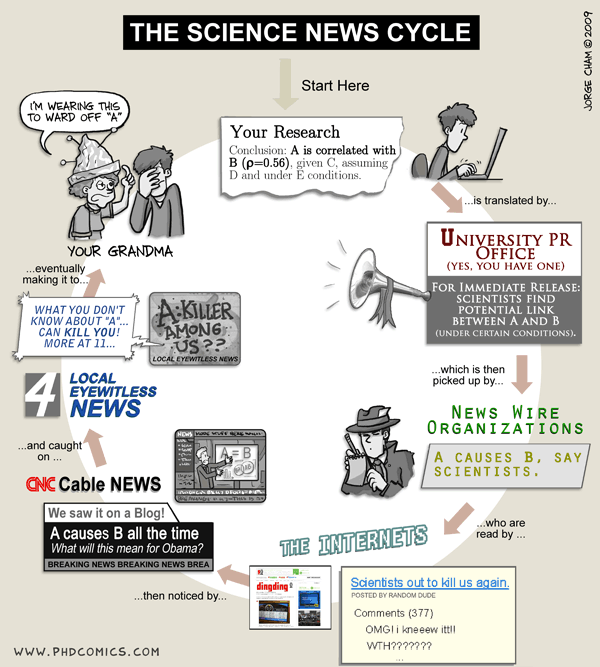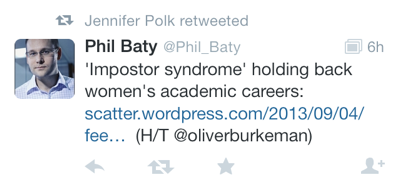“We’re assets, Nicholai. Expendable assets… and we’ve just been expended.”
Carlos Olivera in Resident Evil: Apocalypse (2004)
It’s probably good advice never to trust scientific findings that are reported on the Internet or in mainstream outlets — unless you can talk with experts and find out what they really mean. Crucial information usually gets lost on the way to the printed story.
Heck, PhD comics immortalized it in this beautiful comic strip:

Recently, I began to notice just how bad this bias is — especially when it comes to “The Internets” and gender effects. Note that this is usually not from evil intention or the like, it’s just the perspective from which things are seen today (and it’s an interesting question why the focus is on these aspects, but that’s something for another posting).
For example, take this tweet:

The posting this person refers to is over at scatterplot (you find further information in the referenced magazine article, the quotations refer to both sources). Essentially it’s about research regarding the impostor syndrome — the “the feeling that you’ve somehow tricked people into thinking that you’re competent, while believing that your success is the result of luck and others overlooking your flaws” and how that feeling can prevent people from pursuing a scientific career.
First of all, what this person tweets is not wrong per se. And 140 characters are not that much, with the links perhaps as much as a newspaper headline. Without researching the issue as far as the presented data (uh-oh), I see a problem in the way this message oversimplifies the issue and essentially stigmatizes non-affected people while at the same time effectively screwing 1/3 of the affected population.
Stigmatizing non-affected people
“‘Impostor syndrome’ holding back women’s academic careers” implies that this syndrome holds back all women’s academic careers (not “some women’s academic careers”). However, it seems that only 11% of the women who “identified a research-intensive, tenure-track professorship as their current career goal” “downshifted” “toward non-tenure-track positions such as policy work or teaching” (supposing this is all due to impostor syndrome, which is a big assumption). Depending on how the other reported percentages are meant, I suppose 22.5% of women (compared to 27% of men, not that much more) still pursue “a research-intensive, tenure-track professorship as their current career goal”. So, twice that amount of women are still interested in pursuing that career and the impostor syndrome did not lead them to downshift. The rest did not want to go into science anyway. But now they have to live with the stigma that the imposter syndrome is holding back all women’s academic careers — whether it affected them or not, whether they wanted to go into science or not. I’m not a woman but if I were, I would probably say “Thanks and go … yourself for making me appear like a scared bunny afraid of her own skills and accomplishments!”
Screwing 1/3 of the affected population
“She also found that more women than men—11% versus 6%—initially aspired to such positions but had since downshifted.” It’s difficult to make an assessment without looking at the actual numbers. Let’s assume that there were equal numbers of men and women interviewed and 11% of women is the same as 11% of men in actual numbers. If not, this calculation falls apart, but given that collage attendance is — as far as I know — slightly higher for women than for men, not an unreasonable assumption. There is also the issue of separating a consequence of the impostor syndrome (downshifting) and the syndrome itself. Without going into the actual research it is risky to assume that the syndrome also explains downshifting for men (that it is not reported in these postings is another issue) or that all those who downshift also have this syndrome.
But let’s make these assumptions. This would mean that this problem affects twice as many women than men. This means that of the affected population, 2/3s are women, 1/3 are men. A headline like “‘Impostor syndrome’ holding back women’s academic careers” does not deny that men are affected, but it implies that they are not (meaningfully) affected. Otherwise, it would have been “‘Impostor syndrome’ holding back some academic careers”. But the affected men are not worth a mention — how was this about expendable assets?
Consequences
Our need to break complex issues into bite or Twitter-sized nuggets is seriously screwing with us, with our ability to see problems and deal critically and creatively with them. What is tweeted and talked about is one biased view — which is engrained in the public consciousness. We remember the sound bites, the headlines, the tweets — not what lies behind them, esp. if we have to look up original research for it.
The consequence of “‘Impostor syndrome’ holding back women’s academic careers” would be to create workshops for women only — to focus on their impostorism issues. Given that in these workshop would be only for women, it would create the false impression that this problem is genetically determined or strongly entrenched by women’s socialization — which in turn seems very hard to change. It would also leave 1/3 of the affected standing in the rain.
These men would notice that they also feel like impostors and perhaps also downshift. But they would look at the workshops and could not participate, because they have the “wrong” biological sex. Hello resentment. I guess men are expendable in this perspective, academia is too crowded anyway.
Personally, I think the only way to deal with these disadvantages and problems — any disadvantages and problems — is to look at the relevant characteristics — behaviors, cognitions, emotions, etc. — that lead to these challenges/disadvantages and target people with these characteristics. What matters is who has these disadvantages/problems, not which gender they have. You end up not with “workshops for women who feel like a fraud”, but with “workshops for people who feel like a fraud” in which 2/3 are women and 1/3 are male. It wouldn’t be “women have problems in Academia” (= they do not have what it takes), it would be “some people have problems in Academia”.
It could also open up the view that — if this syndrome really is more prevalent in the soft sciences like one of the sources suggests — that this is why more women were affected as they are more frequent in the soft sciences. This makes it not a women’s issue that stigmatizes them, but an issue of the scientific field in question. Much, much better than sex (unchangeable) or gender (entrenched via socialization).
However, this is not something people would like to hear who think that women are disadvantaged as a group. Those who are only concerned with equality of outcome, not equality of opportunity, and thus have no problems with unequal treatment if it is justified by the outcome they envision. After all, focusing only on women is useful for those people who gain money or influence when women’s issues are pursued, or who need a self-worth positive explanation for their own shortcomings as a woman.
But for all those who are genuinely interested in dealing with problems that prevent people from reaching their full potential — I think it’s time to take a step back and look at the way the focus on — ostensibly — women’s issues is harming both men and women. Not only in the ways described above — stigmatizing women and discarding men — but also in not seeing the positive side of things, the victories, the successes. After all “researchers find that impostorism is most often found among extremely talented and capable individuals, not people who are true impostors.” Combine this with the finding that 2/3s of the affected are female — if there is not interaction with gender — that would actually be a positive message for some women and some men in Academia.